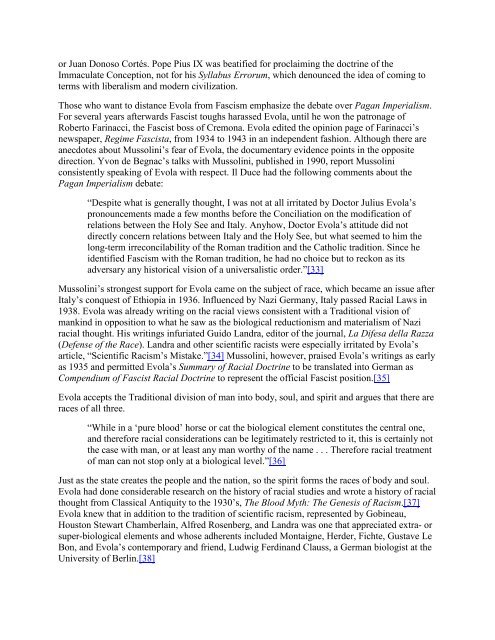Julius Evola On Tradition And The Right.pdf - WNLibrary
Julius Evola On Tradition And The Right.pdf - WNLibrary
Julius Evola On Tradition And The Right.pdf - WNLibrary
Create successful ePaper yourself
Turn your PDF publications into a flip-book with our unique Google optimized e-Paper software.
or Juan Donoso Cortés. Pope Pius IX was beatified for proclaiming the doctrine of the<br />
Immaculate Conception, not for his Syllabus Errorum, which denounced the idea of coming to<br />
terms with liberalism and modern civilization.<br />
Those who want to distance <strong>Evola</strong> from Fascism emphasize the debate over Pagan Imperialism.<br />
For several years afterwards Fascist toughs harassed <strong>Evola</strong>, until he won the patronage of<br />
Roberto Farinacci, the Fascist boss of Cremona. <strong>Evola</strong> edited the opinion page of Farinacci’s<br />
newspaper, Regime Fascista, from 1934 to 1943 in an independent fashion. Although there are<br />
anecdotes about Mussolini’s fear of <strong>Evola</strong>, the documentary evidence points in the opposite<br />
direction. Yvon de Begnac’s talks with Mussolini, published in 1990, report Mussolini<br />
consistently speaking of <strong>Evola</strong> with respect. Il Duce had the following comments about the<br />
Pagan Imperialism debate:<br />
“Despite what is generally thought, I was not at all irritated by Doctor <strong>Julius</strong> <strong>Evola</strong>’s<br />
pronouncements made a few months before the Conciliation on the modification of<br />
relations between the Holy See and Italy. Anyhow, Doctor <strong>Evola</strong>’s attitude did not<br />
directly concern relations between Italy and the Holy See, but what seemed to him the<br />
long-term irreconcilability of the Roman tradition and the Catholic tradition. Since he<br />
identified Fascism with the Roman tradition, he had no choice but to reckon as its<br />
adversary any historical vision of a universalistic order.”[33]<br />
Mussolini’s strongest support for <strong>Evola</strong> came on the subject of race, which became an issue after<br />
Italy’s conquest of Ethiopia in 1936. Influenced by Nazi Germany, Italy passed Racial Laws in<br />
1938. <strong>Evola</strong> was already writing on the racial views consistent with a <strong>Tradition</strong>al vision of<br />
mankind in opposition to what he saw as the biological reductionism and materialism of Nazi<br />
racial thought. His writings infuriated Guido Landra, editor of the journal, La Difesa della Razza<br />
(Defense of the Race). Landra and other scientific racists were especially irritated by <strong>Evola</strong>’s<br />
article, “Scientific Racism’s Mistake.”[34] Mussolini, however, praised <strong>Evola</strong>’s writings as early<br />
as 1935 and permitted <strong>Evola</strong>’s Summary of Racial Doctrine to be translated into German as<br />
Compendium of Fascist Racial Doctrine to represent the official Fascist position.[35]<br />
<strong>Evola</strong> accepts the <strong>Tradition</strong>al division of man into body, soul, and spirit and argues that there are<br />
races of all three.<br />
“While in a ‘pure blood’ horse or cat the biological element constitutes the central one,<br />
and therefore racial considerations can be legitimately restricted to it, this is certainly not<br />
the case with man, or at least any man worthy of the name . . . <strong>The</strong>refore racial treatment<br />
of man can not stop only at a biological level.”[36]<br />
Just as the state creates the people and the nation, so the spirit forms the races of body and soul.<br />
<strong>Evola</strong> had done considerable research on the history of racial studies and wrote a history of racial<br />
thought from Classical Antiquity to the 1930’s, <strong>The</strong> Blood Myth: <strong>The</strong> Genesis of Racism.[37]<br />
<strong>Evola</strong> knew that in addition to the tradition of scientific racism, represented by Gobineau,<br />
Houston Stewart Chamberlain, Alfred Rosenberg, and Landra was one that appreciated extra- or<br />
super-biological elements and whose adherents included Montaigne, Herder, Fichte, Gustave Le<br />
Bon, and <strong>Evola</strong>’s contemporary and friend, Ludwig Ferdinand Clauss, a German biologist at the<br />
University of Berlin.[38]
















